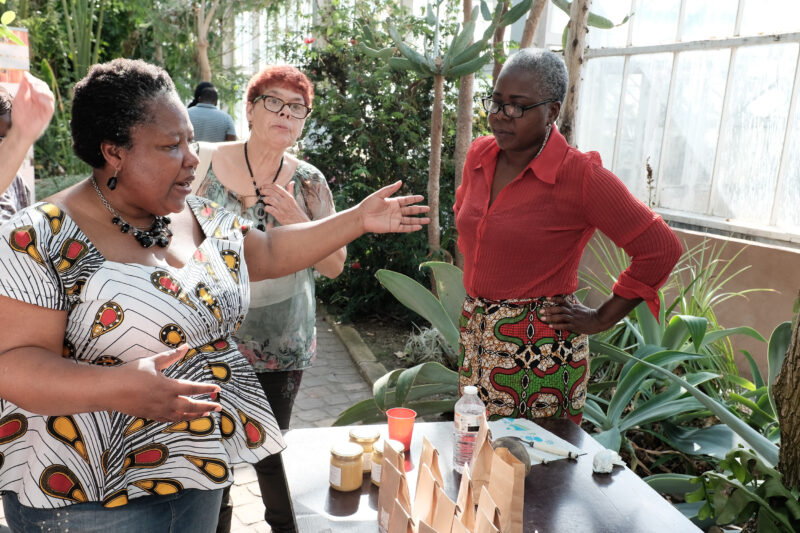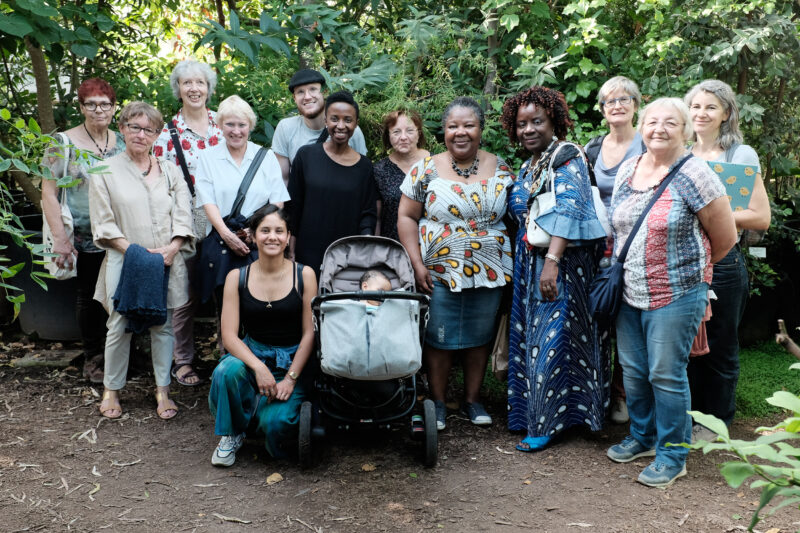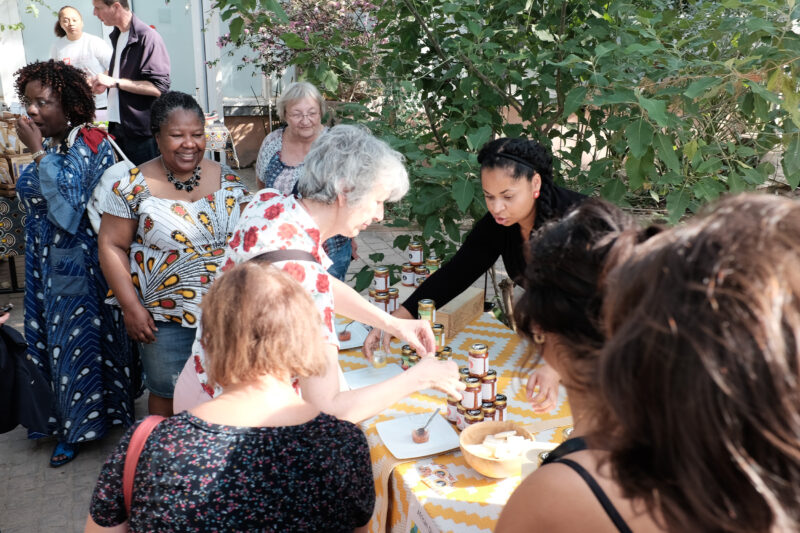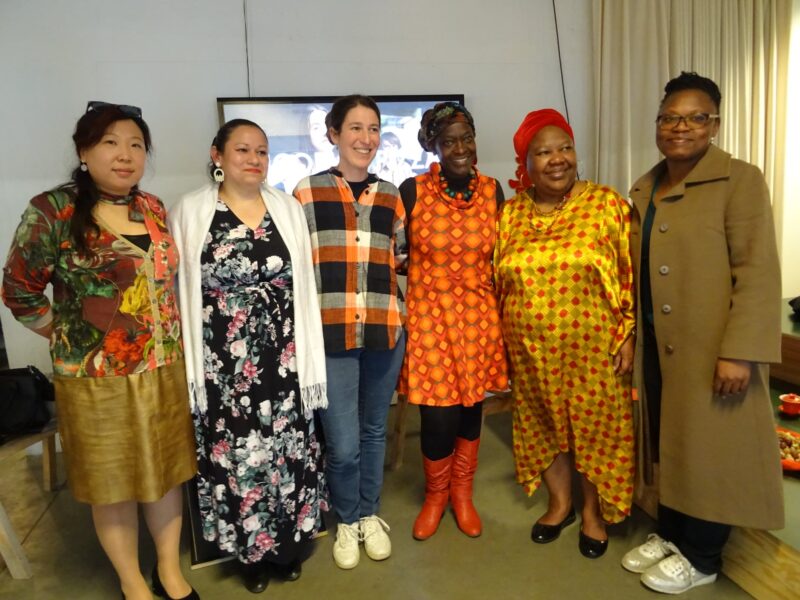text
Food Bridge
Interview with Maureen Duru
“Food should always be people-centered, not money-centered” — Maureen Duru: The Food Bridge
“How did the Food Bridge come into existence?”
Maureen Duru: “I started the Food Bridge because of my academic research. I did a doctorate in history, focusing on African diasporas, food and identity. I wanted to see how migration shaped their identity, and especially how food was used as a cultural tool. From a historical perspective, it was interesting to see how different groups use food in their interactions.
When I completed my doctorate, I thought it would be a good idea to set up a non-profit organisation that would look at food culture in a broader sense especially its potential as a development tool. So, it was no longer only about African diasporas, but also about different food cultures from all around the world. We started organising and participating in seminars and conferences and cultural events. Not only in the socio-cultural sector, but also in the academic sector.
I realised that for you to have a vibrant food culture, irrespective of whether it’s African or European, you must also have a sustainable agro-food sector. The agro-food sector produces the food that people use first for sustenance and as a means of cultural signification and identification modes. This motivated us to become more involved in entrepreneurship in the food sector.
Being involved in different food related projects then enabled us to start working with bigger organisations in the same area of interest. What has helped us grow and something that still helps us, is the partnerships we have developed over the years. Not only on a national level but also internationally. We really are fortunate. We’re a small group of dedicated people, capable of coming up with great ideas. But sadly, especially in a world like now, you can have great ideas, but they cannot come to fruition if you do not have the resources. Thus far having the resources to actualise some of our ideas is a major challenge too.
The Food Bridge works in four main areas. It doesn’t mean we can’t venture out of these areas, but we focus primarily on these four (and it helps us to be more organised all-around).
We work on food culture and food heritage, agro-food entrepreneurship, food security, and research and education. For all these core areas, we have events and projects throughout the year. And all of this started in May of 2014.”
“You mentioned these four building blocks. Why those specific four?”
MD: “All those four building blocks are linked to the foundation of the Food Bridge. You have the food culture and heritage because it is part of history and identity. Agro-food entrepreneurship makes it possible for food to be produced, processed and sold to the consumers. The agro-food sector also produces the food that is acceptable to a certain society or community as food. We don’t accept the same things as food. We don’t all eat the same food, so people define themselves through what they eat, which ties in neatly with food culture and heritage. We also have projects that work closely with the farmers, processors, and transporters of the food. Insuring food gets to the consumer that need it most, is where the food security comes in too. And then you have the research and education. The input of the academic sector and other researchers are relevant for a sustainable food system. Moreover, an informed and educated agro-food entrepreneur will always work better and the consumer will make better choices.
“Now when you see food, you see it as a commodity. You see it as the business of food. But no, it is the business of people.”
The research part is also linked to food heritage: especially in the African continent when we talk about the domestication of plants. We try to support people to work in a more sustainable way that promotes our biodiversity. Food security and sovereignty are also important to us because people should have control over their food system. What to plant, how they plant it and of course there’s an economic value to all of this.
But above all else, for me and the organisation, food is about people. It’s always been about people. When I say people, it’s not just in terms of the nutrition, but in terms of the production, the consumption. Everything about food should be people-centered and not money-centered. Now when you see food, you see it as a commodity. You see it as the business of food. But no, it is the business of people. That is why we chose those four building blocks. They work together, need each other.”
“What made you study history and do your thesis on diaspora identity and food history, to begin with?”
MD: “It was a convergence of life journeys. My first degree was in history and then a post-graduate in journalism. This was all in Nigeria, where I’m originally from. After that, I worked with a few publishing houses, and then I went into TV production. I started working with an independent production house, one of the first in Nigeria, and then we came up with a concept around food. The idea was to get people from all over the world living in Nigeria to present their food culture. They would prepare a national dish with ingredients that can be found in Nigeria and invite the locals to dine with them. I worked on this program for four years. But then I met my now-husband, I moved to Belgium, and I applied for a master’s program. One of those courses focused on cultures and mentalities. It was taught by professor Peter Scholliers, who eventually became my academic promotor. It was an interesting course because it focused on European culture and food history. The history of food in Europe, some might say. I thought well, I could do this about my own country as well, and the African diaspora, because I hadn’t seen it done before. It combines all my interests, my background as a historian, and my interest in food cultures. I went to the professor after I had finished my master’s degree and asked him if there was a possibility of doing a doctorate in history, researching on food culture and the diaspora identity. And he was very supportive, it was the first time someone had wanted to do this kind of subject in the department. But he liked it and the rest is history.”
“How was it to leave your home country of Nigeria to live in Belgium? I can sense it can be a maddening journey.”
MD: “In a sense, it’s the same story with other African people, maybe even with people from other cultures as well. When you marry a husband who lives in another country, you are expected to join him after the wedding. For me, migration was a complete and total shock. It was a reality check since I never really subscribed to that idea of living outside my country and all that I hold dear. As Nigerians we have this sort of confidence in ourselves, this attitude of ‘I don’t really care, I can achieve anything here’. Yet I came to Belgium. I had a background of having worked for 10 years and being educated. But it was still a shock. The language was the first shock, you know, and then it’s like starting all over, starting to rebuild, starting from zero points without family, without friends, with no support system. If I must be sincere, it was a really difficult time for me. When you don’t have the support network that you have had for years, and you’re all left alone in a strange country. But in a way, I am grateful for all of it because it showed me strengths, I never knew I had.
“Coming here, I had experiences I never thought I would have, I had a lack of resources I never believed I was ever going to experience in life. But I did experience them here, and I am grateful that I did.”
It showed me aspects of life I did not know, and it redefined me. I have more empathy now for different kinds of people and situations. I’m more understanding, I’m more tolerant than I was previously because I’ve lived through this process. Coming here, I had experiences I never thought I would have, I had a lack of resources I never believed I was ever going to experience. But I did experience them here, and I am grateful that I did. It shaped my worldview. I come from the eastern part of Nigeria, and in my culture, success is everything. You are defined by what you have. The things that you do, whom you know. All these material things. Don’t get me wrong, they are relevant, but not the totality of life. I may have noticed the differences or challenges or injustice that other people faced in my country but I never actively did anything about it, unlike here and now. Maybe it was the right time or age, to reflect on things but I’m grateful. My experience in Belgium, the good and the bad all helped me shape my own life better.”
“Did you encounter any racial prejudices? Not only in your own life, but as your organisation as well?”
MD: “I told you about the Nigerian confidence, right? When you come from that environment, your views about who you are quite strong. The first encounter with racism I had was on campus, only I didn’t know that it was racism back then. There are two kinds of racism: there is the blunt kind, where people just flat out tell you that you do not belong here and want you gone. But the other kind, the subtle kind of racism, you must have lived in an environment for a while to understand and pick it up.
It’s a weird thing to say, but I like the open racism. I know where you stand. You have the insignia, the tattoos, it’s all out in the open and clear. I can appreciate that. That is you, your space. You stay over there; I stay over here. But the subtle racism, that’s a whole other story. You know, the racism that pretends not to be racism, the intellectual, the ones you see amongst the educated. Sometimes you think, maybe I should tap someone on the shoulder and explain to them what they are doing. Do they realise it?
“It is one thing to tell people they are allowed to integrate in your society, but you don’t give them the space.”
When you’re working in this sector, you encounter three kinds of people. The first group is the kind that cares about humanity. From all walks of life and from all different cultures, they just want a better world. They support people and all the projects that benefit that goal of creating a better world and better humanity. The second kind of group is the ones who have a Messiah complex. They do all of this because they think they will be the saviour of the uncivilized and undeveloped not bothering to actually listen to these people, their views and needs. The last kind of group is the most difficult one, and maybe even the most dangerous. But dangerous is such a hard word to use here. It is the kind of people who have no clue. They are the rebels, who perhaps came from a family with a racist background or are following the trend of what they think shows them as ‘modern’ open minded. They are the first to take up fights over issues that many of us may not even be interested in. They confuse what is discrimination and what it means to hold someone accountable for their actions. Sometimes they waste time fighting for badly behaved people that they distract from the serious issues of actual racism and discrimination that need serious attention. Some may say we need them all, in a way it is a reflection of the complexities of human nature.
If you are educated, you know that all those arguments for racism, discrimination or against migration are bad because they are built on falsehood. An even bigger problem is some of the policies and those that make them. Many of the organisations and offices whose work focus on issues nationally and internationally that has to do with for example Africa, may not have any staff of African origin or include Africans in discussions about these issues or even projects that is supposed to be for Africans. Some of these people pretend to support a cause in public but nothing in their private life has anything to do with diversity. You promote diversity but have no social or personal interaction with people of other cultures. You see it also amongst young people when they are in the university, they are all for the good of everyone, humanity, anti-racism. As they get older, their personal interests might shift, and they start to support rubbish or they become very Machiavellian. what gets them to where they need to be is all that matters.
A lot of people of migrant origin in the socio-cultural and development sectors also experience these things. It is even more painful because the people in these sectors are supposed to be allies, working on our side. It is supposed to be the levelling ground, the rallying point. But there are two sides to this, on the other side you also meet amazing people that compensate for the other side.”
“You had all of this experience. You travelled to a new country and established a non-profit. How did you encounter Netwerk Aalst?”
MD: “There was a call for a project by the Equal Opportunities Department of the Federal Government. It was for an anti-racism project, and someone sent it to me. I read through it, and I had had this idea that would bring people together from different cultures to use food to discuss broader issues. I wanted to have a project that looks at what we have in common rather than the things that divide us because each time you mention racism, people go on the defensive because it seems like an attack. But I believe racism needs to be addressed from both sides. I’m not denying the difference, but the idea behind the project was to show that we have the same values and that the same things are important to us. That is how the Humanitas Project came into existence. We submitted the idea and it got approved, so all kinds of different women from different cultures came together. We started talking about the most important cycles of life through food. Marriage, childbirth and funerals. We use food for the same things, just in different ways. This tied in neatly with the idea of doing a project to share common values and beliefs. The idea was to start from food and use that opportunity to discuss broader issues. We talked about those issues including religion, families, polygamy, divorce, suicide, miscarriages to handicap. And because it all started from food, the way it is used, people saw it as not confrontational and also saw that basically people want the same things in life.
“Politics and religion will always be loaded with negativity, but not food.”
The women shared information and talked about what happens in their different cultures. After the live and virtual sessions, we then produced a film with some of the women and also a booklet for children. The film was completed in September, but we still needed places for the screening in East Flanders. I was living in Aalst then, and during the lockdown, I always went for walks along the canal. I saw Netwerk Aalst, but I never knew what it was about, or what they did in the place. I just concluded it was a typical conservative Flemish space for white people, but one day I noticed on the walls of the building there were a bunch of pictures of people from all different kinds of backgrounds. I thought that could be interesting, so I walked in and told them who I was, about my organisation and what I was looking for. They were happy to provide a place. I met Charlotte from the team, we started talking and I gave her a copy of the book I had written earlier in 2017 about Diaspora, food and identity. It was important also because if we’re going to collaborate, she needed to have a broader view of where I was coming from, and what this is all about. I came in and had a look around and we went on a tour of the building which was really an eye-opener. I immediately started talking to her about the different possibilities and potentials, not just for the Food Bridge, but for also the African community.
We planned to have a screening of the film, and for me, it was interesting to see the possibilities in this sector, especially in a place like Netwerk Aalst. There is the possibility of the film screening or coming in to watch films. There is the possibility of having exhibitions. There is the possibility of having music concerts and there are events halls and meeting rooms. It all fitted together nicely with what I wanted to do with the Food Bridge and our partners too. So, this space is welcoming, which is important. I think as more people discover it, it will be a unique space for promoting diversity in a city like Aalst.
All of this, what we talked about today, is the reason why I like working with food. Politics and religion will always be loaded with negativity, but not food. Otherwise, we wouldn’t have that many Chinese restaurants around. Politically, China and The West don’t really get along. But when it comes to food, no one really bats an eyelid. I like making these projects because one way, you show a new culture to people, but also you sit down with people, learn from them and try to give new meaning to food.”
“Do you have anything else at all you might add to or say to the people who might read or hear this? Any last parting words?”
MD: “If the last two years (of covid) taught me anything, it’s that we are just human beings. We are the same, it doesn’t matter if you are rich or poor, it doesn’t matter if you are black, pink, yellow or brown. During the pandemic race wasn’t important, social hierarchy wasn’t important. All we cared about was how do we survive this and how do we protect humanity. People will always have their idiosyncrasies and their ideas. But the Food Bridge and the Humanitas project showed me that we are more alike than we think. Let’s focus on the things that we have in common, the values that bind us. Stop all the narratives that tear us down, that destroy us, that reduce the humanity of other people.”
Watch the Humanitas project film here >




10.06.2022
